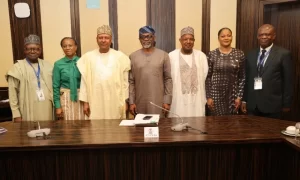

WOMEN IN ENERGY DEMANDS EXPEDITED DELIVERY OF DEREGULATION DIVIDENDS
We in the Women in Energy Network (WIEN) keenly follow the emerging developments in the Nigerian domestic fuel market, especially the determination of the new administration of the federal government to activate the relevant sections of the Petroleum Industry Act 2021 that relate to market reforms.
We observe that the sensitive points in the reform process include removal of fuel subsidy, deregulation of retail prices and liberalization of play.
WIEN congratulates President Bola Ahmed Tinubu on his inauguration following the 2023 general elections. We are excited at the enthusiasm of the new president to carry out urgent reforms in the critical sections of the economy. This shows that he is prepared and determined to steer the country into the paths of rapid recovery and accelerated growth.
However, given the poverty level in the country and the strategic economic role of petrol in energizing homes and small businesses in the country, the polarization of standpoints among stakeholders on the ongoing market reforms is understandable, normal and expected.
Mrs Funmi Ogbue,President WIEN in a statement said the body gives sufficient consideration to the pains and shocks that will inevitably accompany the ongoing reforms in the market, especially with the fuel subsidy removal. We are convinced that the decision to permanently address the subsidy imbroglio is well intentioned and purposed to cause the much canvassed reforms in the market.
The emerging domestic fuel market is the expected result of over 20 years of strong advocacy mounted by all stakeholders in the economy to dismantle public sector monopoly and guarantee broader opportunity for viable investments in providing the Nigerian business environment with wide ranging fuel options for home, social and business application.
Deregulation of market prices and liberalization of supply which are key prizes of the ongoing reforms will provide the highly needed congenial atmosphere for implementation of stalled programmes aimed at availing the economy new energy choices like natural gas products for transportation, power generation and industrial application.
Emerging commercial competitiveness in the market will undoubtedly spur local and international investments in country’s Decade of Gas programme, boost production of new energy forms and solidify Nigeria’s position in the global movement towards low carbon energy. The overall economic benefits in terms of employment, patronage of local goods and services, and ancillary small and medium scale business opportunities would far outweigh the poorly managed fuel subsidy which has created more damage to the economy and actually caused more suffering to the people.
A deregulated and liberalized domestic fuel market will no doubt save money for government, enhance price competition, promote service efficiency, phase out perennial fuel scarcity and expand the capacity of the market to absorb more investments.
WIEN believes that Nigerians need more opportunities and ambient business environment than they need subsidies to thrive. This has been demonstrated by the large number of Nigerian youths who have migrated out of the country and succeeded in foreign lands where they are not direct beneficiaries of social security cover.
We therefore appeal to our Nigerian compatriots to be calm and supportive to the new government as it sorts through strategies to deliver the best economic dividends from the country’s petroleum resources. For instance, reapplication of the poorly managed fuel subsidy funds to creation of enhanced social services, development of facilities and infrastructure and enhanced electricity supply will yield greater impact in the social economy.
We believe that deregulation and liberalization are the only way forward for the domestic fuel market in view of the prevailing circumstances. We also call on government to quickly put measures in place to urgently deliver the realizable social and economic dividends of the market reforms to alleviate the impacts on the people.
It has become urgent at this point for the government to hasten the market transition process and shorten the time for delivery of convincing quick wins to the people.
Also, the relevant agencies of the state should collaborate with industry stakeholders to fine tune the emerging regulations in order to weed out all remaining impediments to fair play and best market practices.
The emerging market regulations must necessarily address grave concerns about discriminatory foreign exchange rates, creation of market supply oligopoly, huge demurrages at import reception ports, and barriers to new market entrants, especially women.
With the new vista of commercial opportunities opening up in the domestic fuel market, we call on all capable ladies in the country to pick up the gauntlet and explore investments in the downstream petroleum industry. WIEN is convinced that more women in the industry will come with greater regulatory compliance especially on health, safety and environment standards.
Safety and forecourt standards are natural to us.
We therefore see the ongoing market reforms as first opportunity for the new administration of the federal government to launch off its gender diversity plans in the industry by easing entry processes for women seeking to participate in providing the economy variegated energy forms through the market.





